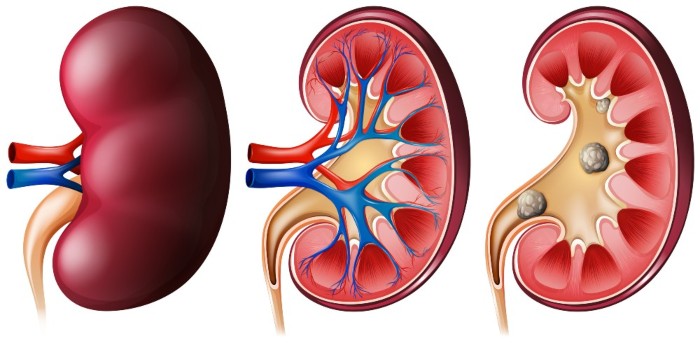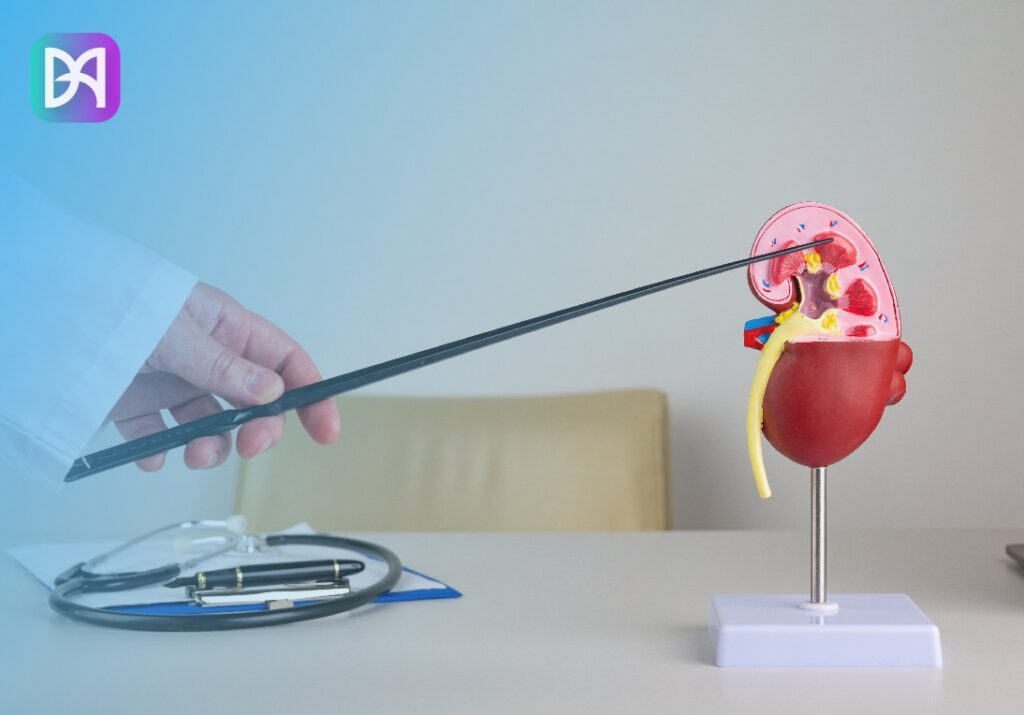Renal calculi, often known as kidney stones, are solid objects composed of crystals. Anywhere along your excretion tract—which includes the kidneys, ureters, bladder, and urethra—they can form.
Table of Contents
ToggleWhat Are Kidney Stones and Why Do You Get Them?
Waste materials like uric acid or minerals i.e. calcium create hard deposits called kidney stones. As additional minerals adhere to them, they may enlarge from their initial modest size in your kidneys.
Kidney stones can range in size from the size of a pea to as little as a grain of sand. They can occasionally resemble golf balls in size. They might be smooth or jagged and are often yellow or brown in hue. A kidney stone may be an excruciating medical condition.
Depending on the type of kidney stone, there are several reasons. The crystals that make up kidney stone vary accordingly. The following elements are included in the various forms of Kidney Stones and are described below.

Calcium
Calcium stones are the most common type of stones in the kidney. CaC2O4 often forms them, but calcium phosphate or maleate can also create them. To lower your risk of developing calcium oxalate stones, try eating fewer foods high in oxalates. Some high-oxalate foods are as following:
- Potato chips
- Peanuts
- Chocolate
- Spinach
However, it’s important to note that getting enough calcium in your diet can help prevent stones from forming.
Uric Acid
The second most prevalent kind of kidney stone is this one. Gout, overweight or diabetes, and other forms of metabolic syndrome can all cause them.
When urine is very acidic, this kind of stone forms.
Urine’s acidity can rise as a result of a purine-rich diet. Animal proteins like those found in fish, shellfish, and meats include purine, a colorless material.
Struvite
Urinary tract infections (UTIs) are the main cause of this kind of stone. Urinary blockage might result from these big stones.
Kidney infections cause struvite stones. Struvite stones can be avoided by treating an underlying infection.
Cystine
Worldwide, the incidence of cystine stones is around 1 in 7,000. They can affect both men and women with cystinuria, a hereditary condition.
Cysteine, a naturally occurring acid, seeps from the urinary tract into the urine in cases of this kind of stone.
What Are the Kidney Stone Symptoms?
Kidney stones can cause intense pain, especially when they move into the ureters. This pain, known as renal colic, often starts suddenly and can be severe. You can also might feel pain on one side of your lower back or abdomen. In men, the pain can spread to the groin. Renal colic pain comes and goes but can be very intense, often making it hard to stay still.
Other kidney stone symptoms are as following:
- Blood in the urine, which may look red, pink, or brown
- Vomiting and nausea
- Urine that is cloudy, dark, or smells bad
- Chills and fever
- Needing to urinate often but passing only small amounts
Sometimes, a kidney stone is small enough to pass without causing pain or symptoms (Kidney Stone Symptoms) as it moves through your urinary tract.
Causes of Kidney Stone Pain
Kidney stones are most common in people aged 20 to 50. Certain factors can raise your chances of getting them. In the United States, white people are more likely to develop stones than Black people.
Gender also plays a role. Men are more likely than women to have stones, according to the National Institute of Diabetes and Digestive and Kidney Diseases (NIDDK).
If you’ve had stones in the kidney before or if they run in your family, your risk goes up. Other factors that increase the risk are as following:
- Not drinking enough water
- Being overweight
- Eating a diet high in protein, salt, or sugar
- Having a hyperparathyroid condition
- Undergoing gastric bypass surgery
- Having inflammatory bowel diseases that raise calcium absorption
- Taking certain medications like triamterene diuretics, antiseizure drugs, or calcium-based antacids
By addressing these risks, you may reduce your chances of developing stones.
Treatment of Kidney Stone
The sort of stone determines the treatment of kidney stone. Stones can be collected and urine strained for analysis.
Drinking up to eight glasses of water daily increases urine flow. Individuals suffering from severe diarrhea, vomiting, or dehydration may need intravenous fluids.
Medications & Pain Management
Kidney Stone Pain relief may need medications. For Example; ibuprofen (Advil), acetaminophen (Tylenol), or naproxen sodium (Aleve). In also some cases, stronger narcotic medicines might be necessary. If there is an infection, antibiotics are required to treat it.
For specific types, doctors may prescribe as following:
- Allopurinol (Zyloprim) to reduce uric acid levels and prevent uric acid stones.
- Thiazide diuretics to stop calcium stones from forming.
- Sodium bicarbonate or sodium citrate makes urine less acidic.
- Phosphorus solutions to help prevent calcium stones.
Each medication targets a specific cause or symptom to provide relief and prevent future stones.
Is Kidney Stone Surgery Possible?
A lot of stones go away on their own devoid of any further help. Others could require surgical removal. There is more than one way for the surgery.
Stones in the kidney may require surgery (Kidney Stone Surgery) to remove if :
- They are too big to pass through naturally.
- You’re getting hurt a lot.
- The stone is blocking the passage of urine from your kidney.
- You’ve had multiple UTIs due to the stone.
Lithotripsy
This procedure uses high-energy shock waves to break stones into smaller pieces. It works best for small or medium stones (less than 2 centimeters or about 1 inch) and doesn’t require surgery, so there are no cuts on your skin.
During SWL, you lie on a table while the doctor gives you medicine to manage any pain or discomfort.
Using an X-ray or ultrasound, the doctor locates the kidney stone. Then, they send shock waves through your skin to break the stone into tiny pieces.
Sometimes, the doctor places a stent in your ureter (the tube that carries urine from your kidney to your bladder). The stent helps the stone fragments pass more easily. Most patients return home the same day after the surgery, which typically takes an hour.
After SWL, you’ll need to drink plenty of water to flush out the stone fragments in your urine. You may need to use a strainer to catch the fragments so a lab can analyze them.
Ureteroscopy
Although it can also eliminate kidney stones, doctors frequently use this surgery to treat small to mid-sized stones in the ureters. It’s a good choice for people who can’t have shock wave lithotripsy, such as those who are pregnant, very obese, or take blood thinners.
During the procedure, your doctor will use a thin, flexible tube called a ureteroscope to locate and remove the stones. No cuts will be made on your skin, and you’ll be asleep throughout the process.
Your doctor will guide the scope through your bladder and ureter into your kidney to find the stones. However, the procedures for different sizes of stones vary. For small stones, they will use a small basket to remove them. If the stones are larger, your doctor will use a laser beam to break them into smaller pieces. However, in some cases, your doctor may place a stent in your ureter to help urine flow from your kidney to your bladder.
Some stents have a string attached, so you can remove them at home. Be sure to follow your doctor’s instructions carefully if you need to do this yourself.
Open Surgery of Kidney Stones
Although patients seldom require open surgery for kidney stones these days, surgeons might perform it if the stone is exceedingly big or cannot be broken up or retrieved with other therapies.
You might need open surgery if:
- The stone is stuck in your ureter.
- You’re experiencing severe Kidney Stone Pain.
- The stone is blocking urine flow.
- You’re bleeding or have an infection.
During the procedure, you’ll be given anesthesia to make you unconscious. The surgeon will make an incision in your side and kidney to remove the stone.
A stent will be placed in your ureter to help with urine drainage. After the surgery, you may need to stay in the hospital for about six days.
Ultimate Line
Even though kidney stones can be an excruciating and annoying problem, there are several therapeutic alternatives.
In actuality, a variety of drugs and treatments are available to assist in controlling symptoms and facilitate kidney stone clearance. Long-term stones can also be avoided by maintaining adequate hydration and altering your diet.
Frequently Asked Questions (FAQs)
What is the average time for a kidney stone to pass?
The size of a kidney stone might affect how long it takes to travel through the body. Small stones often dissolve in the urine in 1-2 weeks, frequently without any medical intervention. Larger stones, however, can take two to three weeks to pass past the kidneys and enter the bladder. Above all, medical attention is necessary for stones that don’t go away on their own after four weeks.
How be kidney stones avoided?
Staying properly hydrated is one of the best ways to prevent stones in the kidney. Make sure you consume enough water each day to generate at least 2.5 liters of excrement. This helps flush out your kidneys and reduces the risk of stones forming. You can boost your fluid intake by drinking water, ginger ale, lemon-lime soda, or fruit juice. Lemonade or orange juice, which are rich in citrate, may especially help if low citrate levels are linked to your stones.
To lower your risk further, eat oxalate-rich foods in moderation and cut back on salt and animal protein. Your doctor might also recommend medications to prevent calcium or uric acid stones. If you’ve had kidney stones before or think you’re at risk, talk to your doctor about the best prevention strategies for you.




